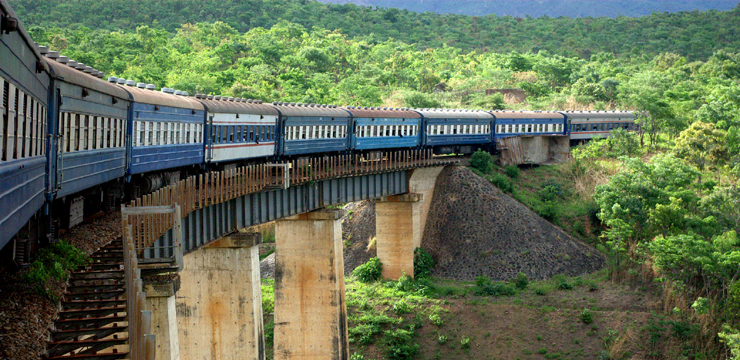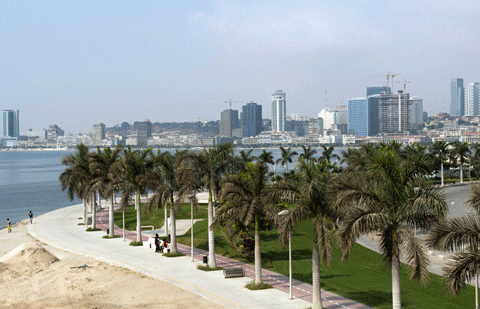Taking stock
Updated: 2014-05-02 09:24
By Li Lianxing in Nairobi (China Daily Africa)
Comments Print Mail Large Medium SmallDaouda Cisse, a research fellow with the Center for Chinese Studies at Stellenbosch University in South Africa, says that while China's economic growth is lower than it has been over the past 30 years, its ties with Africa will remain strong and become more diversified.
"Basically the volume of trade is likely to remain important, and the positive aspect is the changing pattern of trade. With Chinese exports slowing, Africa could enhance its manufacturing sector, which has had to face competition from products made in China. This could enable African countries to tackle the issue of trade with China that is out of balance mainly through the composition of trade - resource exports in most cases versus imports of manufactured goods."
But Cisse also says that the measures that China recently unleashed to promote infrastructure development through construction of railways may feed its appetite for resources such as copper, cobalt, steel and iron, that some African countries are endowed with.
"Resources will be a major interest in Africa's trade with China. However, interest in other sectors such as manufacturing and services including information and communications technologies, finance and insurance involving both public and private sectors is growing on both sides."
Manufacturing is considered crucial to Africa's growth, and joint ventures between African private businesses and their Chinese counterparts could be one way of developing the sector in Africa, Cisse says.
"But the private sector in Africa has to make sure that kind of approach develops African industry, contributing to employment, skills and technology transfer. Relocation of Chinese companies to Africa that conforms with rules, regulations and policies or joint ventures with private companies, if well managed by host African countries, could be another way of enhancing manufacturing in Africa through technology transfer and skills development."
|
Clockwise from above: Azwimpheleli Langalanga, a researcher at the South African Institute of International Affairs in Johannesburg; Daouda Cisse, a research fellow with the Center for Chinese Studies at Stellenbosch University in South Africa; Liu Jie, the representative in Kenya for the China-Africa Development Fund. Photos provided to China Daily |
Azwimpheleli Langalanga, a researcher at the South African Institute of International Affairs in Johannesburg, says the slowing of China's economy may have little impact on Africa's growth because of the special economic relationship between the two economies.
"China's role in Africa is mainly linked to its quest for raw materials, chiefly minerals and oil. However, China's involvement in Africa is largely through state-owned enterprises. This means that a slowing economy may not have a significant impact on its economic involvement in the continent as it would not affect the reserves China (uses to invest in) Africa."
He says that if Chinese ties with Africa entailed the latter exporting finished products to China, the slowdown there would greatly affect Africa. And if Africa faced economic difficulties, that would affect China as the latter's finished products have a ready market in the continent.
"But I do not see China buying fewer minerals and less oil in Africa because of an economic slowdown. Chinese companies have enough capital to continue financing infrastructure development in the continent. The key to all this is the involvement of Chinese state-owned enterprises, which are well capitalized. If Chinese involvement in Africa was mostly driven by private companies, the economic slowdown in China would be worrying."
But changes in China also provide opportunities for Africa, such as firms that are becoming uncompetitive in China because of high labor and operating costs relocating to the continent, he says.
"This would lead to the development of manufacturing in Africa, which in turn could use the infrastructure that China is helping build in the continent."
Liu Jie, the representative in Kenya for the China-Africa Development Fund, says economic reform in China provides a perfect opportunity for the country and Africa to develop the economy.
"From a meso- and micro-economic perspective, the African market could become crucial to the Chinese economy, and Africa's growth could greatly benefit from China's growth. For example, China has become Kenya's biggest trading partner and investor, which means its old, simple trade ties are evolving into a more sophisticated and sustainable partnership."
There are certain rules and parameters within which an economy can be slowed, he says, laying solid foundations for future robust growth, and what needs to be remembered is that China's economy is still very healthy.
In the partnership between China and Africa, it would be short-sighted and risky to treat Africa as a whole, because there are many dimensions to their relationship.
"We have to support many resource-rich countries in building up large-scale infrastructure projects or give them loans on favorable terms, and this is more suitable with giant state-owned enterprises. But for many that don't have raw materials and resources, we have to concentrate on light industries or manufacturing, which presents an opening for private companies."
China's economic future will be determined by new driving forces rather than exports, Liu says. So companies must focus on overseas consumption and overseas investment, and Africa is one of the best destinations, he says.
Africa is still not well equipped for industrialization, he says, but this gives Chinese companies a chance to build Africa's infrastructure, such as power, water and transport.
"But manufacturing is the most important thing. For example, Africa's information and communications technologies industry is no worse than that of China or Western countries, so one day handset and chip card manufacturing could be done in Africa."








